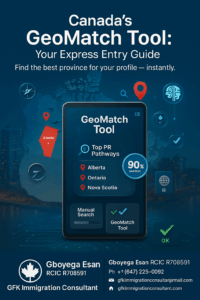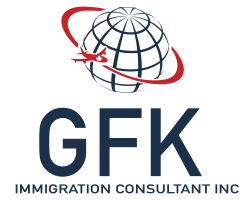
Canada’s GeoMatch Tool: Your Express Entry Guide
Canada’s immigration system is embracing innovation with the pilot testing of the GeoMatch Algorithm, a collaborative project between Immigration, Refugees, and Citizenship Canada (IRCC) and Stanford University.
GeoMatch creates individualized suggestions on places in Canada where immigrants could have the best economic results by combining an income prediction model, regional features, users’ location, and other preferences.
GeoMatch will be tested with a group of Express Entry applicants in this voluntary, cutting-edge Proof of Concept project, which could improve participants’ economic results in Canada and customer experience.
This cutting-edge tool could redefine economic integration for newcomers, addressing long-standing challenges in Canada’s immigration framework.
Table of Contents
What is the GeoMatch Algorithm?
GeoMatch is an advanced algorithmic tool designed to recommend optimal settlement locations for immigrants based on their professional skills, education, language proficiency, and other relevant factors.
By analyzing labour market data, regional economic needs, and individual candidate profiles, GeoMatch suggests destinations across Canada where newcomers are most likely to secure employment and thrive economically.
The algorithm prioritizes factors such as job availability, wage levels, and community support systems to ensure a successful transition.
Developed in partnership with Stanford University’s Immigration Policy Lab, GeoMatch leverages machine learning to process vast datasets, offering personalized recommendations that go beyond traditional immigration streams.
While still in its pilot phase, the tool is being tested within the Express Entry system, Canada’s flagship program for skilled economic immigrants.
Why GeoMatch Matters
Canada’s immigration system has long grappled with the challenge of ensuring newcomers settle in regions where their skills are in demand.
Historically, many immigrants gravitate toward urban hubs like Toronto, Vancouver, and Montreal, leading to overcrowding, housing pressures, and underemployment in certain professions.
Meanwhile, smaller cities and rural areas often face labour shortages in critical sectors like healthcare, trades, and technology.
GeoMatch addresses this mismatch by guiding candidates toward regions with better economic opportunities.
For example, a software engineer might be directed to Kitchener-Waterloo, Ontario, a growing tech hub, while a nurse could be recommended for a rural community in Saskatchewan with a shortage of healthcare workers.
By diversifying settlement patterns, GeoMatch aims to alleviate pressure on urban centres and boost economic growth in underserved regions.
IRCC’s 2025–2026 Departmental Plan highlights GeoMatch as a key component of its digital transformation strategy, emphasizing data-driven solutions to enhance immigration outcomes.
The pilot aligns with Canada’s 2025–2027 Immigration Levels Plan, which reduces permanent resident admissions to 395,000 in 2025 to prioritize sustainable growth and better integration.
How GeoMatch Works
GeoMatch is expected to operate by integrating multiple data sources:
-
- Candidate Profiles: Information from Express Entry applications, including education, work experience, language skills, and occupation.
- Labour Market Data: Real-time insights into job vacancies, wage trends, and industry demands across Canada’s provinces and territories.
- Community Factors: Availability of settlement services, housing affordability, and Francophone community support for French-speaking candidates.
The algorithm processes this data to generate a ranked list of recommended settlement locations tailored to each candidate’s profile.
For instance, a candidate with expertise in renewable energy might be matched with opportunities in Alberta’s clean-tech sector, while a teacher proficient in French could be directed to a Francophone community in New Brunswick under the Welcoming Francophone Communities initiative.
During the pilot phase, GeoMatch recommendations are optional, allowing candidates to choose their preferred destination.
However, IRCC hopes the tool will encourage informed decision-making, reducing instances of underemployment and improving long-term economic outcomes.
IRCC is yet to release detailed eligibility criteria or a public-facing interface.
IRCC is expected to assure users that GeoMatch complies with Canada’s privacy laws and that recommendations are advisory, not mandatory.
Challenges and Future Prospects
While GeoMatch holds promise, its pilot phase faces challenges:
- Data Accuracy: The algorithm’s effectiveness relies on up-to-date labour market data, which can vary across regions and industries.
- User Adoption: Convincing candidates to settle in less familiar regions, such as rural areas, may require additional incentives like housing support or relocation grants.
- Integration Support: GeoMatch must be paired with robust settlement services to ensure newcomers thrive in their recommended locations.
IRCC plans to evaluate the pilot’s outcomes by mid-2026, with potential expansion to other immigration streams, such as the Provincial Nominee Program (PNP) or the Atlantic Immigration Program.
If successful, GeoMatch could become a cornerstone of Canada’s immigration system, complementing initiatives like the Rural and Northern Immigration Pilot.
A Step Toward Smarter Immigration
The GeoMatch Algorithm represents a bold step toward modernizing Canada’s immigration system.
By harnessing data and technology, IRCC aims to create a win-win scenario: newcomers find meaningful employment, and Canada’s regions benefit from their skills.
As the pilot progresses, its success will depend on addressing public concerns, refining the algorithm, and ensuring equitable access to its benefits.
For now, Express Entry candidates can look forward to testing GeoMatch’s recommendations, with the potential to reshape their Canadian dream.
For more information, visit IRCC’s official website or consult a licensed immigration professional.
GFK Immigration
Gboyega Esan RCIC R708591
Phone: +1 (647) 225-0092
#CanadaPR #Citizenship #GFKImmigrationExperts #studyincanada #Steinbach #canada #Alberta #studyinaustralia #ielts #studentvisa #studyinusa #studyvisa #immigration #canadavisa #visa #education #internationalstudents #overseaseducation #study #canadaimmigration #ExpressEntry
